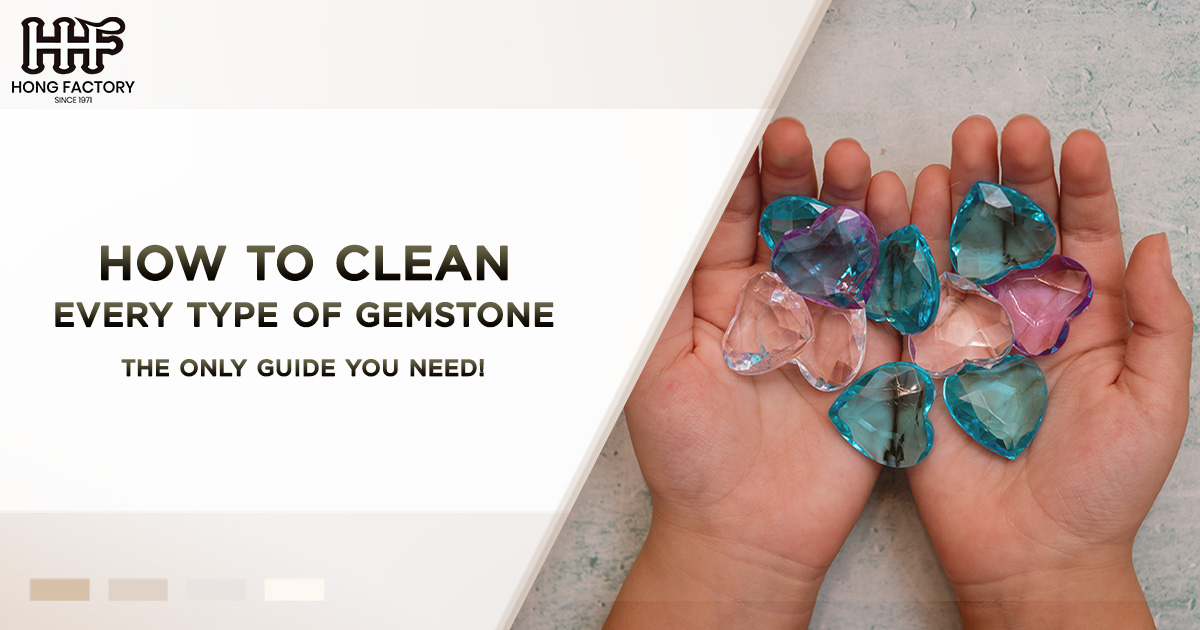Gemstones are timeless treasures that captivate with their beauty and brilliance. To keep them shining for generations, proper care and cleaning are essential. Different gemstones require different cleaning methods, and knowing the right approach can prolong the life of your jewelry. Whether you’re dealing with diamonds, emeralds, or opals, this comprehensive guide will walk you through gemstone cleaning methods for all types.
Why Proper Gemstone Cleaning Matters
Gemstones are delicate, and each has unique characteristics that determine how they should be cleaned. Using incorrect methods or harsh chemicals can cause irreversible damage. For example, diamonds are hard, but opals are soft and porous, so they require very different care. Regular cleaning not only keeps your gems sparkling but also helps maintain their value over time.
Key Considerations for Gemstone Cleaning
- Gemstone Hardness – Softer gems need gentler cleaning methods.
- Porosity – Some gemstones absorb liquids, so avoid soaking them.
- Chemical Sensitivity – Some gems react badly to harsh chemicals like ammonia.
Let’s break down specific cleaning methods for different types of gemstones.
Cleaning Diamonds
Diamonds are one of the hardest known materials, which makes them more resilient to various cleaning methods. However, they can still collect dust, oils, and dirt, which dulls their sparkle.
How to Clean Diamonds
- Safe Solutions – Mix warm water with a gentle dish soap.
- Method – Soak the diamond in the solution for 15-20 minutes. Use a soft toothbrush to scrub gently, paying attention to the setting and crevices. Rinse under warm water and pat dry with a lint-free cloth.
- Maintenance Tip – Clean diamonds once a month to maintain their brilliance. Avoid using abrasive cleaners or harsh chemicals like bleach.
Cleaning Sapphires and Rubies

Sapphires and rubies are both part of the corundum family, making them tough and relatively easy to clean. These gems are highly resistant to scratching, but dirt and oils can still build up on the surface.
How to Clean Sapphires and Rubies
- Safe Solution – Use a mixture of warm water and mild soap.
- Method – Soak the gemstone for 15-20 minutes. Gently scrub with a soft brush, focusing on the gemstone’s surface and setting. Rinse thoroughly and dry with a soft cloth.
- Maintenance Tip – Clean every few weeks for optimal shine. Avoid ultrasonic cleaners if the stone has fractures, as the vibrations can exacerbate these cracks.
Cleaning Emeralds
Emeralds are a softer stone compared to diamonds and rubies and often contain inclusions or fractures. They are also typically treated with oils to enhance their appearance, so they require special care.
How to Clean Emeralds
- Safe Solution – Use lukewarm water and a mild soap.
- Method – Gently clean the emerald with a soft cloth or brush, avoiding excessive scrubbing. Do not soak emeralds, as soaking may remove the oils used to enhance the gemstone. After cleaning, dry immediately with a soft, lint-free cloth.
- Maintenance Tip – Emeralds should be cleaned every few months. Avoid ultrasonic cleaners, steam cleaners, and harsh chemicals like alcohol or ammonia.
Cleaning Pearls
Pearls are not technically gemstones but are often set in fine jewelry, so they deserve special mention. Pearls are organic and porous, making them highly susceptible to damage from chemicals, heat, and even water.
How to Clean Pearls
- Safe Solution – Use a very mild, non-detergent soap.
- Method – Dampen a soft cloth with the soap solution and gently wipe each pearl. Do not submerge pearls in water, as this can weaken the string if the pearls are strung together. After cleaning, gently pat dry with a soft towel.
- Maintenance Tip – Clean pearls after each wear to remove body oils and dirt. Store them separately in a soft cloth pouch to avoid scratching.
Cleaning Opals
Opals are delicate, soft, and water-sensitive. They’re known for their vibrant play of color, but improper cleaning can lead to cracks and loss of luster.
How to Clean Opals
- Safe Solution – Use lukewarm water and a mild soap.
- Method – Gently wipe the opal with a damp cloth. Avoid soaking, as opals are porous and can absorb water, leading to damage. Dry the opal immediately with a soft cloth.
- Maintenance Tip – Opals should be cleaned only when necessary, and stored in a cool, dry place. Avoid exposure to high heat, as it can cause the opal to crack.
Cleaning Turquoise
Turquoise is another delicate and porous gemstone. It can absorb oils and chemicals, which can lead to discoloration.
How to Clean Turquoise
- Safe Solution – Use only a soft cloth dampened with plain water.
- Method – Gently wipe the surface of the turquoise with the cloth. Avoid soaking or scrubbing the gemstone. Dry immediately with a soft cloth.
- Maintenance Tip – Avoid exposure to oils, perfumes, and chemicals. Store turquoise jewelry separately to prevent scratching and discoloration.
Cleaning Amethyst, Citrine, and Quartz
Amethyst, citrine, and quartz belong to the quartz family and are relatively hard, making them more durable and easier to clean compared to softer gemstones.
How to Clean Amethyst, Citrine, and Quartz
- Safe Solution – A mixture of warm water and mild soap will suffice.
- Method – Soak the gemstone for 15-20 minutes, then scrub gently with a soft brush. Rinse thoroughly and dry with a soft cloth.
- Maintenance Tip – Clean these gemstones every 1-2 months to maintain their brilliance. Be cautious with extreme heat or prolonged exposure to sunlight, which can cause color fading.
Cleaning Garnets
Garnets are durable and can handle a bit more robust cleaning, but it’s still important to avoid harsh chemicals and overly abrasive materials.
How to Clean Garnets
- Safe Solution – Use warm water with mild soap.
- Method – Soak the garnet for 15-20 minutes, then scrub gently with a soft toothbrush. Rinse thoroughly and dry with a soft cloth.
- Maintenance Tip – Clean garnets every 1-2 months. Avoid using ultrasonic cleaners if the garnet contains fractures or inclusions.
Cleaning Topaz
Topaz is a relatively hard gemstone, but it can be brittle, so it’s important to clean it with care.
How to Clean Topaz
- Safe Solutions – Warm water and mild soap.
- Method – Soak the topaz for about 10-15 minutes, then use a soft brush to clean the surface lightly. Rinse and dry with a soft cloth.
- Maintenance Tip – Clean topaz monthly, and avoid exposure to chemicals and extreme heat, which can damage the stone’s color.
General Gemstone Maintenance Tips
- Avoid Harsh Chemicals
Many gemstones are sensitive to chemicals found in household cleaners, perfumes, and even lotions. Always remove your jewelry before using any potentially harmful products.
- Store Properly
Proper gemstone storage is crucial. Soft gemstones, like pearls or turquoise, can easily be scratched if stored with harder stones like diamonds or sapphires. Use individual pouches or soft cloths to store your gemstones separately.
- Inspect Regularly
Check for loose settings, chips, or cracks in your gemstones. Regular inspections by a jeweler can help prevent more significant damage or loss.
- Professional Cleaning
While home cleaning is effective, it’s a good idea to take your gemstone jewelry to a professional jeweler at least once a year for a deep clean and inspection.
Conclusion
Proper gemstone cleaning and maintenance are essential for preserving their beauty and value. With a little care and the right cleaning methods, you can keep your gemstones sparkling for years to come. Whether you’re caring for diamonds, emeralds, or delicate opals, always use safe solutions and handle your gems with care. By following the tips in this guide, you’ll ensure that your gemstone jewelry remains a treasured part of your collection.





